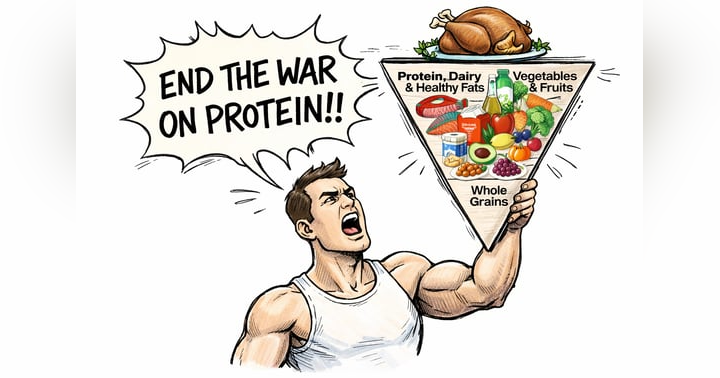Why RFK’s Med School Nutrition Mandate Sounds Good… But Isn’t
When Robert F. Kennedy Jr. announced that he wants to require nutrition education in every U.S. medical school—or else they’ll lose federal funding—you could almost hear the collective "Finally!" from the wellness world. On the surface, it sounds like a slam-dunk: doctors should know more about nutrition, right?
Absolutely. But as someone who lives at the intersection of medicine and nutrition, let me tell you—this idea, while well-intentioned, misses the mark.
I have a unique perspective here. I’m a physician assistant and a registered dietitian. I’ve worked in both exam rooms and kitchens, and I’ve built an entire platform around teaching medical professionals how to deliver better, evidence-based nutrition advice. Maybe you've heard of Exam Room Nutrition. So yes, I’ve seen the gaps—and the frustration—firsthand.
But before we crown this proposal the fix-all for what ails American healthcare, let’s dig into what’s really going on.
First: Med Students Do Learn About Nutrition (Just Not Enough)
The talking point that “doctors get zero nutrition education” is catchy, but it’s not entirely accurate. Medical students do learn nutrition basics. They’ll cover things like carbohydrates and diabetes, sodium and hypertension, maybe a sprinkle of vitamins and minerals depending on the school. It’s not nothing.
Is it enough? No. But it’s not nothing.
The issue isn’t that doctors don’t know anything about nutrition—it’s that their education stops short of what’s actually practical. They get the pathophysiology. They memorize the dietary guidelines. But when it comes to translating that knowledge into everyday conversations with patients? That’s where things fall apart.
Why? Because medical education is crammed, and once you finish school, the real nutrition questions patients have—what to eat when they’re busy, broke, or burned out—aren’t on the boards. They’re in the break room, the grocery store, or the pediatric checkup when a parent says, “Doc, my kid won’t eat vegetables.”
That kind of coaching isn’t something you get from a single med school lecture. It’s something you learn from experience—or, better yet, from working alongside someone who’s trained to do it.
Which brings me to my next point.
Newsflash: There’s an Entire Profession for This
Hi. It’s us. Registered dietitians.
We are literally trained in nutrition. That’s our thing.
To become a dietitian, you need a master’s degree in nutrition (not public health, not “lifestyle wellness”—actual nutrition science). We spend years studying anatomy, biochemistry, food science, and medical nutrition therapy. We complete 1,200 hours of supervised practice, pass a board exam, and maintain ongoing continuing education. And unlike the average physician, we don’t get nutrition training as an elective—we are the nutrition training.
So while I appreciate RFK’s effort to prioritize food in medicine, the idea that we’re going to fix this by giving med students one or two required courses is… optimistic. At best.
The Real Problem Isn’t Education—It’s the System
Let me say this louder for the people in the back: doctors aren’t failing their patients because they don’t care. They’re not ignoring nutrition because they forgot about the DASH diet.
They’re failing because they’re overbooked, overwhelmed, and trapped in a system that prioritizes volume over value. In a typical 15-minute appointment, a provider might have to manage labs, renew meds, counsel on lifestyle changes, address the patient’s top concerns, update the chart, and navigate insurance hurdles—all before they even think about the food.
It’s not that they don’t want to talk about nutrition. It’s that they’re fighting a system that punishes them for spending time doing so.
If RFK really wants to improve healthcare through nutrition, he should be looking at the structure—not just the syllabus.
A Smarter Solution? Start in Residency
If we really want doctors to learn about nutrition in a way that sticks, we need to teach it when it matters most: in residency.
That’s when medical professionals start specializing. A family medicine resident might treat diabetes every day. An orthopedic resident might see osteoporosis cases weekly. That’s the moment to bring nutrition into the fold—not in the preclinical years when students are still trying to survive pharmacology and memorize the Krebs cycle.
Let’s tailor the education to the specialty. Let’s make it practical. Let’s integrate it with real patient scenarios. And while we’re at it—let’s not pretend doctors have to do it all alone.
Patients Don’t Need More Information. They Need Application.
Here’s the kicker: most patients aren’t lacking information. They’re drowning in it.
They know fast food isn’t great. They know soda has sugar. They’ve seen the documentaries and read the headlines. What they need is help connecting the dots between knowing and doing.
That’s where registered dietitians shine. We’re trained not just in what to eat, but in how to help people change. We talk about habits. We dig into barriers. We tailor plans. We coach—not just educate.
So instead of doubling down on more nutrition lectures in medical school, how about this: let’s make it easier for patients to see a dietitian. Let’s fix the broken reimbursement models. Let’s increase access, especially in underserved communities. Let’s make it financially feasible for dietitians to do what we’re trained to do—without needing a physician referral in every state or jumping through hoops to get covered by insurance.
Let’s stop treating dietitians like an optional add-on and start treating them like the essential healthcare providers they are.
Healthcare Is a Team Sport
We don’t expect orthopedic surgeons to manage chemotherapy. We don’t ask dermatologists to do root canals. So why are we expecting primary care physicians to be the sole source of nutrition advice?
Healthcare is a team sport. And when it comes to nutrition, registered dietitians are the MVPs you want on the field.
Yes, let’s teach medical students how to recognize when nutrition matters. Let’s teach them the value of referring out. Let’s give them the language to talk about food with compassion and curiosity. But let’s also respect professional boundaries and acknowledge that expertise in nutrition isn’t something you can cram into a semester or two.
It’s something we train for. It’s something we live and breathe.
Final Thoughts? Let’s Do Better Than a Mandate
I’ll be honest: I’m all for improving nutrition education in healthcare. But if we’re going to do it, let’s do it in a way that actually moves the needle.
That means shifting from performative policies to practical change. That means empowering dietitians, reforming insurance policies, supporting interdisciplinary care, and training doctors to collaborate, not compete.
And please—let’s not act like one more med school requirement is going to fix the food crisis in America.
We don’t need more mandates. We need more meaningful, collaborative solutions. The kind that recognize what each member of the healthcare team brings to the table—and that nutrition, like healthcare itself, works best when no one’s doing it alone.






